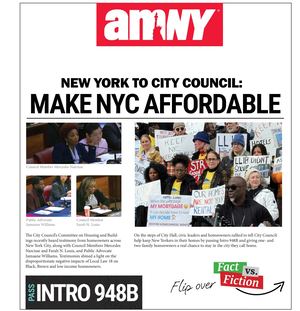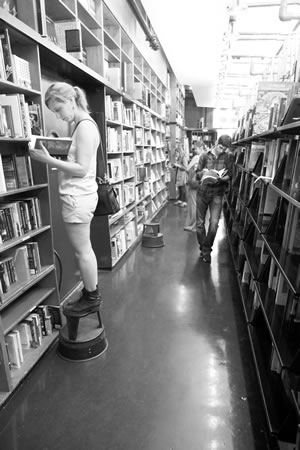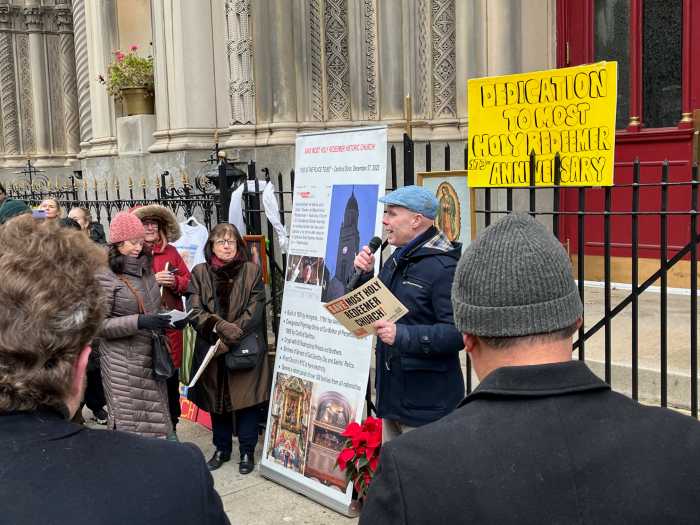By Aidan Gardiner
The latest local victim in an ongoing national trend afflicting independent booksellers, St. Mark’s Bookshop has considerably downsized its staff due to rising costs and declining sales.
The current economic downturn coupled with steep overhead costs and dwindling sales finally forced the management of St. Mark’s Bookshop, on Third Ave. near E. Ninth St., to lay off all of the shop’s part-time staff and to reduce the hours of full-timers. The downsizing occurred last October, but the business continues to struggle because of the ongoing economic stresses.
David Russo, a manager at the bookstore, said St. Mark’s is enduring a “perfect storm.”
“We were in a precarious position and when you add what happened with the economy in general — there you go,” he said. “We’re particularly vulnerable to that because of the price of our real estate. It’s people turning to e-readers and that sort of thing.”
According to Russo, St. Mark’s is in no danger of shuttering in the short term, but the store’s situation is still dire.
“I wouldn’t say it’s merely a little tight, but I wouldn’t say we’re planning on closing the store,” he said. “That’s not the plan right now, but that is a possibility, I would have to say.”
Staff at St. Mark’s have said that one of the main reasons they are struggling to eek out a profit is because larger e-book sellers have changed consumer habits and expectations.
According to the American Booksellers Association, in-store book sales have only grown by 0.2 percent since last year, but comparable data shows that e-books are dramatically outpacing their traditional counterparts. In April, the American Association of Publishers reported that e-books experienced a roughly 200 percent increase since 2010.
According to Russo, now customers will only buy books if they are in stock. He added that he is able to order and stock a book as quickly as 24 hours, but for many customers that is too long a time.
“E-book sellers have changed what people’s perception of service is and what is legitimate to expect in a short period of time,” he said. “If you say to them that you’ll have to order it, a lot of people have a strange idea of what ‘right away’ means.”
St. Mark’s has a minimal online presence and is a member of Google’s e-books store, but Russo said that it isn’t enough to compensate for the shortfall in in-store sales.
“That really hasn’t done anything for us in a big way,” he said.
Other factors like high rent and issues with publishers are contributing to the tough situation for St. Mark’s.
The bookstore occupies valuable real estate and staff members said the landlords are unwilling to lower the rent for the space.
“Mostly, when we deal with them, we’re told that they could get a lot more for the space,” Russo said.
Larger retailers like Amazon and Barnes & Noble are able to extend lines of credit with publishers, unlike their meager independent counterparts. Several booksellers said that publishers are lenient with those industry giants that are more likely to buy larger orders and pay more. Independent stores can be more unpredictable, so publishers tend to be timelier with invoices.
“When publishers don’t get paid the way that they want to get paid, they’ll put us on hold and we can’t get those books in,” Russo said. “They’re putting in that money to pay their people, pay their printers, and pay the people who work in their warehouse. They’re in a pretty similar position, so they have to be stern with us.”
New York has largely been insulated from the poor bookselling market. The ABA partnered with Civic Economics, an economic think tank, and released a report this year that found the New York metropolitan area to be the twelfth-best independent-bookstore business market of 363 others throughout the country.
Other booksellers have said that cultural appetites of New Yorkers help bolster the struggling industry. David Moran of Shakespeare & Co., nearby on Broadway at Washington Place, said that his store is still financially stable in part because many people still have an appetite for local booksellers.
Most other booksellers interviewed for this article said they were seeing a dip in their revenues, but none as drastic as St. Mark’s Bookshop. For the most part they attributed their sales to the nationwide economic slump in consumerism. Moran said that Shakespeare & Co. is healthy enough that it’s actually undertaking an expansion.




































